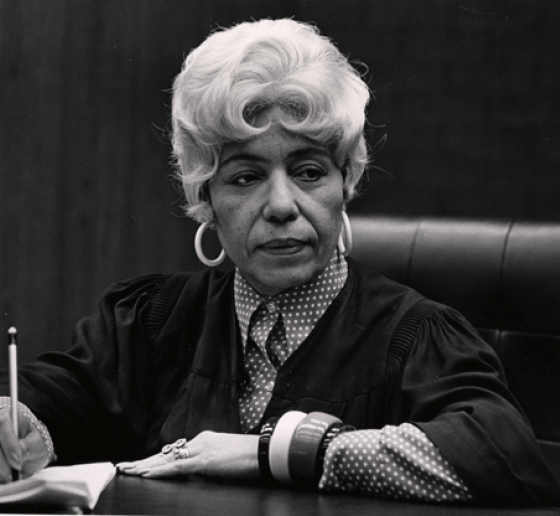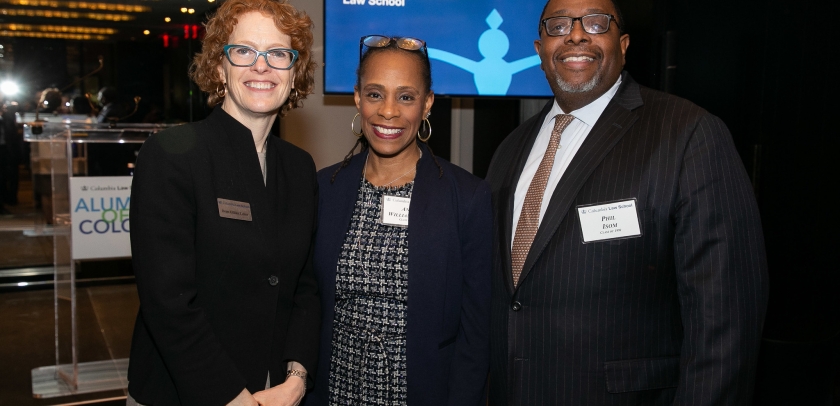Honoring Judge Elreta Alexander ’45, the First Black Woman to Graduate From Columbia Law
Alexander’s biographer and an alumni panel moderated by Professor Kimberlé Crenshaw discuss the pioneering judge’s law school days and her legacy as the first Black woman in North Carolina to practice law, to argue before its Supreme Court, and to be elected a judge.
For decades, Judge Elreta Alexander’s trailblazing role as the first Black woman to graduate from Columbia Law School and her extraordinary career as a litigator and jurist were not well-known beyond North Carolina courthouses. But at a special Alumni of Color event on December 9, more than 200 alumni, students, faculty, staff, and members of the judiciary gathered virtually to celebrate Alexander’s life and legacy. (Watch the full event above.)
“Elreta Alexander, Class of 1945, is someone, I will admit, I knew little about until earlier this year,” said Gillian Lester, Dean and Lucy G. Moses Professor of Law, in her opening remarks. She noted that the current national reawakening on the urgency of confronting racism and racial inequality made honoring the judge’s legacy timely. As a pioneering student Alexander “felt the weight of the future of Black women at Columbia on her shoulders,” said Dean Lester. “Later, after many years of practicing law in North Carolina, she became a judge, and she continued in that role as a force for justice, for innovation, and for healing in her community.”
Following an introduction by George Madison ’80, who helped establish Columbia Law’s Alumni of Color initiative in 2016, North Carolina historian Virginia L. Summey presented an overview of Alexander’s life. Summey’s biography of Alexander, based on her Ph.D. dissertation, Fighting Within the Bar: Judge Elreta Alexander and Civil Rights Advocacy in Greensboro, North Carolina, will be published by the University of Georgia Press in 2021.
Kimberlé Crenshaw, Isidore and Seville Sulzbacher Professor of Law, then led a discussion on the enduring significance of Alexander’s many firsts as well as on diversity within the judiciary today. The distinguished panel included L. Priscilla Hall ’73, associate justice, Appellate Division, Second Department, New York State Supreme Court (2009–2018); James E.C. Perry ’72, a former justice of the Florida Supreme Court (2009–2016); and Andrea Saavedra ’06, assistant dean and dean of judicial clerkships.
A Civil Rights Pioneer
Summey recounted how Alexander was inspired to become a lawyer because she was disillusioned by local politics in Greensboro, where she attended high school and college. Despite growing up in the Jim Crow South, Alexander became more aware of racial issues as a student at Columbia Law, when she discovered that she sometimes unwittingly passed as white. Alexander, Summey said, remarked that her Columbia friends “couldn’t seem to understand how this girl, with so many talents and such fair skin . . . could be identified with Negros.” Indeed, while in school, Alexander “decided to really embrace her Blackness and use that position as an advocate for other African Americans, particularly African American women,” according to Summey.
When she returned to Greensboro in 1947 to practice law, Alexander quickly developed a reputation for a dramatic courtroom style, which Summey describes as “performance activism.” In front of judges in segregated courthouses, Alexander would say, “I’m going to see what the difference is between this white water and this colored water,” and defiantly drink from the white fountain. In courtrooms, she would sometimes sit in the colored section, which caused judges to squirm. When they insisted that she come up to the bar, where the white attorneys were seated, she would reply, “I’m just following the rule of law."
As a litigator, Alexander exposed racial bias in the jury selection process, which led to changes in how jurors were chosen in North Carolina. As a judge, she instituted the progressive Judgment Day program for juvenile offenders: Instead of sentencing them to jail, she allowed them to perform community service and write essays about their crimes and rehabilitation to have criminal charges expunged from their records. (Read more about Alexander’s life and career below.)
Recognizing a Trailblazer
To provide historical context for Alexander’s momentous and overdue firsts, Crenshaw noted that it was 1882 when the first Black man, John Daniel Lewis, graduated from the Law School, and 1929 when the first woman, Margaret Spahr, graduated. Crenshaw asked the panelists to consider the intersectional challenges faced by the first Black woman to graduate from the Law School. She emphasized that the barriers Alexander broke are meaningful “not only as an individual narrative of accomplishment, but also for the lessons and interventions that their pathbreaking makes legible for all those who come behind,” she said.
Perry related that he knew firsthand how difficult North Carolina made it for African Americans to pass the state’s bar: When he graduated from Columbia Law in 1972, he was told that he had to wait 27 months to apply to take the bar exam because of rules that seemed designed to keep African Americans out of the profession, he said, “because we would be good advocates for our people.” Perry said it “took a lot of guts” for Alexander to overcome North Carolina’s discriminatory requirements for taking the bar exam 25 years earlier.
In preparation for the discussion, Hall, who has worked to diversify the New York judiciary, interviewed three people Alexander mentored: two judges and a Greensboro attorney. Her mentees, Hall said, described Alexander as “absolutely brilliant, passionate, visionary, savvy, courageous, kind, a tremendous trial attorney, witty, wise, dignified.
“She was shrewd, had a total recall memory, and the most comprehensive knowledge of the law, plus street sense, and would effortlessly weave quotations from the law, the Bible, and Shakespeare into her arguments in court.”
Columbia Law history buffs may be more familiar with the second Black woman to graduate from the Law School, Judge Constance Baker Motley ’46—who became a national figure as the principal trial attorney for the NAACP Legal Defense and Educational Fund and the first Black woman to be appointed to the federal bench—than they are with Alexander. Saavedra said it’s necessary for the Columbia Law community to consider why Alexander has not been part of the Law School’s narrative history until now. “It’s very important that the faculty and our alumni have come and said, ‘Let’s have this conversation,’” said Saavedra. “I think it took a unique combination of a historian [Summey] who really dedicated a large portion of her career to uncovering this story and then to all the people in between who really believed that it was something that needed to be shared.”
The Alumni of Color network has a responsibility to share stories so “we do not lose them,” said Saavedra, adding that it’s imperative that all members of the Columbia Law community “know about the accomplishments of our Justice Ginsburgs as well as our Judge Alexanders.”
About the Alumni of Color Initiative
The Alumni of Color initiative was established in 2016 under the leadership of Dean Gillian Lester and George Madison ’80. Through annual events with alumni speakers, the Alumni of Color committee works to build community and celebrate the accomplishments of alumni of color. As part of the initiative and with support from alumni, the Law School has established the Eric H. Holder Jr. Scholarship Fund, which provides tuition support to students of color.

